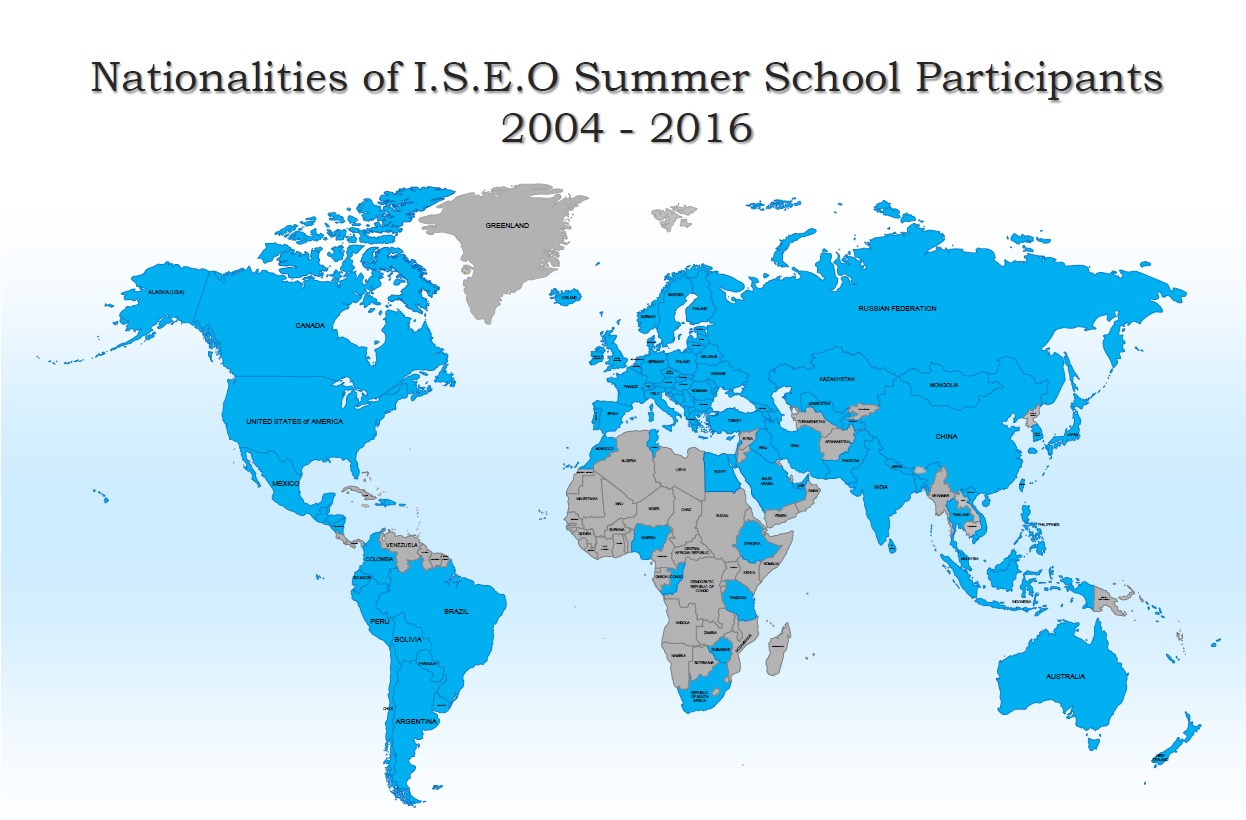Summer School Editions
Summer School 2016
Iseo, 11 - 18 June
Looking forward: new challenges and opportunities for the World Economy
Speakers
Michael Spence
Nobel Laureate in Economics
2001
Angus Deaton
Nobel Laureate in Economics
2015
Joseph Stiglitz
Nobel Laureate in Economics
2001
Guy Standing
Professor at Soa
Emanuele Ferragina
Sciences Po
The I.S.E.O. Summer School of 2016 was held from the 11th till the 18th of June in the town of Iseo, Lombardy, Italy. This year the Summer School gathered together 69 participants from 28 countries and 54 universities around the world.
The 13th edition of the Summer School was titled “Looking forward: new challenges and opportunities for the World Economy”. To enlighten the class of 2016 on the content of this topic, five internationally acknowledged speakers were invited to hold lectures during the week. The I.S.E.O. Summer School of 2016 had the privilege to host three Nobel Laureates: Angus Deaton (Nobel Prize in Economic Sciences in 2015), Michael Spence (Nobel Prize in Economic Sciences in 2001) and Joseph Stiglitz (Nobel Prize in Economic Sciences in 2001) who focused their lectures on their research topics in the field of economics. Specifically, prof. Deaton lectured on the topic “Why is it hard to measure global poverty, and so hard to find out what works to reduce it”, prof. Spence focused on his fascinating research on “Growth, Inclusion and Political Stability”, whereas prof. Stiglitz probed deep into the “Inequality of Income and Wealth Among Individuals: causes, consequences and what we can do about it”.
In addition, this year’s I.S.E.O. Summer School program allowed participants to become acquainted with other outstanding economists. This was accomplished via the inclusion of two more speakers: Guy Standing, professor at SOAS University of London who held a wonderful lecture on “Responding to Rentier Capitalism”, and Emanuele Ferragina, an assistant professor from Sciences Po University, who focused on “Welfare State, Redistribution and Crisis”.
During the week, participants attended all the morning and afternoon lectures held by the speakers. However, three of the summer school participants also had the opportunity to present their own research to the rest of the groups and to the Nobel Laureates. This year these participants included Mallory Montgomery from the United States of America, Almir Sovic from Bosnia and Herzegovina and Ines Österle from Germany.
However, the I.S.E.O. Summer School was not only hard work. The participants had multiple opportunities to interact with each other and the speakers (including Nobel Laureates, who were always at disposal to discuss with students) during various free time activities, from shopping to canoeing. Participants were also offered the possibility of tasting traditional Italian dishes and local specialties in various restaurants around Iseo. One of the highlights of the I.S.E.O. Summer School was the traditional gala dinner, organized in the nearby Berlucchi vineyard. Furthermore, not all days were spent near the Iseo area. The participants also attended a couple of excursions, such as a day trip to Venice and a boat tour to Iseo Lake where they could see before the official opening the monumental installation titled ‘The Floating Piers’ created by artist Christo Vladimirov Javacheff.
To conclude, the 13th edition of the I.S.E.O. Summer School was, just like its predecessors, a balance of academic moments and leisure. Long-lasting memories for all participants, speakers and students.
If you want to learn more about the I.S.E.O Summer School 2016, please view the photo gallery, the video gallery and consult the materials presented by the speakers (available here below).
The I.S.E.O. Summer School of 2016 was held from the 11th till the 18th of June in the town of Iseo, Lombardy, Italy. This year the Summer School gathered together 69 participants from 28 countries and 54 universities around the world.
The 13th edition of the Summer School was titled “Looking forward: new challenges and opportunities for the World Economy”. To enlighten the class of 2016 on the content of this topic, five internationally acknowledged speakers were invited to hold lectures during the week. The I.S.E.O. Summer School of 2016 had the privilege to host three Nobel Laureates: Angus Deaton (Nobel Prize in Economic Sciences in 2015), Michael Spence (Nobel Prize in Economic Sciences in 2001) and Joseph Stiglitz (Nobel Prize in Economic Sciences in 2001) who focused their lectures on their research topics in the field of economics. Specifically, prof. Deaton lectured on the topic “Why is it hard to measure global poverty, and so hard to find out what works to reduce it”, prof. Spence focused on his fascinating research on “Growth, Inclusion and Political Stability”, whereas prof. Stiglitz probed deep into the “Inequality of Income and Wealth Among Individuals: causes, consequences and what we can do about it”.
In addition, this year’s I.S.E.O. Summer School program allowed participants to become acquainted with other outstanding economists. This was accomplished via the inclusion of two more speakers: Guy Standing, professor at SOAS University of London who held a wonderful lecture on “Responding to Rentier Capitalism”, and Emanuele Ferragina, an assistant professor from Sciences Po University, who focused on “Welfare State, Redistribution and Crisis”.
During the week, participants attended all the morning and afternoon lectures held by the speakers. However, three of the summer school participants also had the opportunity to present their own research to the rest of the groups and to the Nobel Laureates. This year these participants included Mallory Montgomery from the United States of America, Almir Sovic from Bosnia and Herzegovina and Ines Österle from Germany.
However, the I.S.E.O. Summer School was not only hard work. The participants had multiple opportunities to interact with each other and the speakers (including Nobel Laureates, who were always at disposal to discuss with students) during various free time activities, from shopping to canoeing. Participants were also offered the possibility of tasting traditional Italian dishes and local specialties in various restaurants around Iseo. One of the highlights of the I.S.E.O. Summer School was the traditional gala dinner, organized in the nearby Berlucchi vineyard. Furthermore, not all days were spent near the Iseo area. The participants also attended a couple of excursions, such as a day trip to Venice and a boat tour to Iseo Lake where they could see before the official opening the monumental installation titled ‘The Floating Piers’ created by artist Christo Vladimirov Javacheff.
To conclude, the 13th edition of the I.S.E.O. Summer School was, just like its predecessors, a balance of academic moments and leisure. Long-lasting memories for all participants, speakers and students.
If you want to learn more about the I.S.E.O Summer School 2016, please view the photo gallery, the video gallery and consult the materials presented by the speakers (available here below).

Nationalities of I.S.E.O Summer School Participants
2004-2016
